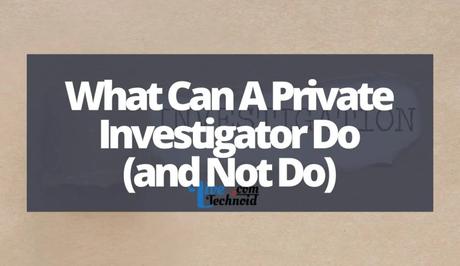You might wonder what a private investigator can do and can not do. If you are hiring a private investigator, or you believe you’re being investigated, knowing what a PI can and cannot do is important.

First and foremost, a private investigator cannot hack into someone's computer or phone. This is against the law and if caught, the PI would be subject to criminal charges.
A private investigator also cannot break into a person's home or office without their permission. This is considered trespassing and is a crime.
However, a private investigator can conduct surveillance on a person. This might include following them or watching their house or office. A PI can also look through public records to find information about a person.
In short, a private investigator can do many things to collect information about a person. However, there are some things that a PI cannot do. It is important to know the difference between fact and fiction when it comes to private investigators.
What is a private investigator?
A private investigator (often abbreviated to PI and informally called a private eye), a private detective, or inquiry agent, is a person who can be hired by individuals or groups to undertake investigative law services. Private detectives/investigators often work for attorneys in civil and criminal cases.
What is a detective?
A detective is an investigator, usually a member of a law enforcement agency. They often collect information to solve crimes.
What is the difference between private investigators and detectives?
The main difference between a private investigator and a detective is that a private investigator is hired by an individual or organization, while a detective is employed by the government.

5 Things Private Investigators Can & Can't Do
5 Do's and Don't for Private Investigators:
Here are the 5 things a P.I Can Do
- Can: conduct surveillance
- Can: skip tracing
- Can: find missing persons
- Can: conduct background checks
- Can: consult an attorney
Here are the 5 things a P.I Can’t Do
- Can’t: trespass
- Can’t: hack into computers or phones
- Can’t: Impersonate someone
- Can’t: bug devices
- Can’t: violate client confidentiality
If you're considering hiring a private investigator, it's important to know what they can and cannot do legally. You can consult and continue reading here at Expert Investigations and learn more about private investigations.
While here are five things that private investigators can do, as well as five things they should avoid doing:
- Conduct Surveillance
This is one of the most common services that private investigators provide. PIs can conduct surveillance on a subject to find out information about their whereabouts, activities, and associates.
- Skip Tracing
Skip tracing is the process of finding a person who is missing or hiding from someone. This can be done through various methods, such as online research, public records searches, and interviews with friends and family members.
- Find Missing Persons
Private investigators can also help find missing persons. This can be done through skip tracing, surveillance, and other methods.
- Conduct Background Checks
Background checks are another common service provided by PIs. This involves researching a person's criminal history, employment history, and financial history.
- Don't Trespass
Trespassing is illegal, and private investigators should never do it. If they need to conduct surveillance on someone, they should do so from a public place.
- Don't Hack into Computers or Phones
Hacking into someone's computer or phone is a serious crime. Private investigators should never do this, even if they are trying to find out information about a person's activities.
- Don't Impersonate Someone
Impersonating someone is illegal, and private investigators should never do it. This includes using false identification, such as a fake ID or driver's license.
- Don't Bug Devices
Placing a bug on someone's phone or computer is illegal, and private investigators should never do it.
- Don't Violate Client Confidentiality
Private investigators should never violate a client's confidentiality. This means that they should not reveal any information about their clients or their cases to anyone without their permission.
- Do Consult an Attorney
If you're considering hiring a private investigator, it's important to consult an attorney. They can advise you on the legalities of hiring a PI, as well as what they can and cannot do. There are some cases like Employee Dismissal due to theft and dishonesty that you can also ask for consultation by an attorney. Probate Solicitors in Leamington Spa also does Law consultations for Businesses. You can check more of their details here.
What would be the advantage if I hired a private investigator for my business?
There are many benefits to hiring a private investigator. They can help you find out information that you would not be able to find on your own, and they can do it confidentially and legally. Additionally, they can help you save time and money by conducting investigations that would otherwise be very costly and time-consuming.
Finally, they can provide you with peace of mind by knowing that someone is looking into your case and working to find answers. We always want the best for our business. That is why we need to be extra careful in every decision that we make. The same goes when you are planning to hire a private investigator. You need to know the do's and don'ts to avoid any legal complications. Always remember that it is better to be safe than sorry. If you have any doubts, always consult an attorney. They can advise you on the legalities of hiring a PI, as well as what they can and cannot do.
Hiring a private investigator can be a great way to get the information you need, but it's important to know what they can and cannot do. By understanding the limitations of private investigators, you can ensure that your investigation is conducted legally and correctly.

Can a Private Investigator Arrest Someone?
The simple answer is no; Private Investigators cannot arrest anyone. Only sworn law enforcement officers have the legal authority to make an arrest. There are, however, a couple of caveats to this rule. First, if the person in question is wanted by law enforcement and the private investigator has information leading to their whereabouts, the investigator can notify law enforcement of this information. The second caveat is if the person in question has committed a crime in the presence of the investigator. In this case, the investigator can make a citizen’s arrest until law enforcement arrives.
Other than these two scenarios, private investigators do not have the legal authority to make arrests. If you are in need of someone to be arrested, you will need to contact your local law enforcement agency.
Conclusion
Private investigators are a great resource for businesses and individuals alike. They can help you find information that you would not be able to find on your own, and they can do it confidentially and legally. However, it's important to know what they can and cannot do. By understanding the limitations of private investigators, you can ensure that your investigation is conducted correctly and within the bounds of the law. If ever you need a P.I. for your business, you can check this link for more options. You may also contact an attorney to help you with the legalities of hiring a private investigator.
This article is for informational purposes only and does not constitute legal advice. If you need legal advice, please consult an attorney.
Also, See:
- Best Credit Cards for Young Adults
- How Many Credit Cards You Should Be Carrying
- How to Make Your Friends List Private on Facebook

Found this post helpful? Please, endeavour to share!
Similar posts:
- How to Download Private Vimeo Videos
- What Education is Required to Become a Cybersecurity Expert?
- Compensation for Employees
- How to Make Your Friends List Private on Facebook
- How to View Private Instagram Profiles
